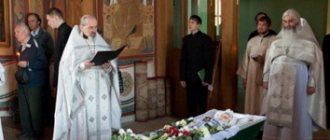The funeral service is a special prayer service established by the Church for parting words and seeing people off to another world. It includes strictly defined alternations of stichera, canon, reading of the Apostle and the Gospel. And, since more than half of the prayers are sung in it, this service was popularly called the “funeral service.”
The holding of this rite indicated that this person was known to the community and the priest, and people gathered to see him off on his last earthly journey. Now, despite the fact that community members live more separated, the meaning of the funeral service should still be preserved. If the deceased was a member of the Orthodox Church, if he was engaged in his spiritual life, if he confessed and received communion (at least sometimes), if he participated, at least minimally, in the life of the community - the Church can give him a farewell message. Christians present at the service must pray and ask God for help to the soul of the person being buried.
The funeral service should not be considered just a ritual. In this case, the rite will be the burial itself, but not the funeral service. Very often people say: “I took part in the rite of Baptism”, “We performed the wedding ceremony”, etc. It is not right. After all, a ritual is only an external, symbolic expression of the essence of belief. With the help of ritual, a person tries to clothe the invisible in the visible in order to make it more understandable. But behind the form there is always something more.
A memorial service and a funeral service are different things, for some reason they are often confused.
A memorial service is simply a funeral prayer for the deceased . It can be performed both before the funeral service and after. The rite, which is called the funeral service, is performed over the deceased once, on the day of his burial.
Litiya is the final part of the funeral service. This service is a very short prayer. By the way, lithium for a loved one can be performed at a grave or at home not only by a clergyman, but also by a simple layman.
The funeral service must take place in the church. In exceptional cases, this ceremony is performed directly at the graves (previously this was allowed during military operations or epidemics). But now, thank God, there is no war! Sometimes the funeral service can be performed at home. But, if a believer is already buried, what prevents relatives from bringing his body to the temple - the house of God? After all, it is pleasant and gratifying for the soul to be there! By the way, since ancient times, according to tradition, the deceased was not only buried in the temple, but also left there for three days. And during this time, right up to the funeral, the Psalter was read for the deceased.
It is customary for Orthodox Christians to bury them in a coffin, which remains open until the end of the funeral service (if there are no special obstacles to this).
The funeral service and burial are usually performed on the third day. The first day is considered to be the day of death itself. That is, if a person died on Tuesday before midnight, then it is customary to bury him on Thursday, and if on Saturday, then on Monday.
It is important to note that on the first day of Easter and on the Feast of the Nativity of Christ, the deceased are not brought into the church and funeral services are not performed.
The body of the deceased in the coffin is covered with a special white cover (shroud) - as a sign that the deceased, who belonged to the Orthodox Church and united with Christ in her Holy Sacraments, is under the protection of Christ, under the patronage of the Church - she will pray for his soul until the end of time . This cover is decorated with inscriptions with texts of prayers and excerpts from the Holy Scriptures, an image of the banner of the cross and angels. Relatives ask for forgiveness for involuntary insults, kiss the icon on the chest of the deceased and the aureole on the forehead. In the case when the funeral service takes place with the coffin closed, the cross on the coffin lid is kissed.
At the end of the funeral service, after reading the Apostle and the Gospel, the priest reads a prayer of permission. After reading the prayer of permission, farewell to the deceased occurs. Relatives and friends of the deceased walk around the coffin with a bow.
A paper whisk is a symbol of a crown , a symbolic designation of the fact that the deceased has gone into Eternal Life as a warrior who has won a victory on the battlefield. The chaplet reminds us that the exploits of a Christian on earth in the fight against all suffering, temptations, seductions and passions are over, and now he expects a reward for them in the Kingdom of Heaven.
Among people who do not understand the essence of religion, there is a widespread opinion that a funeral service is a kind of “pass to heaven.” Many believe that if a funeral service has been performed for the deceased, then he was buried “humanly”, and “the soul is now in heaven, sins are forgiven”! And if they didn’t sing the funeral service, then the soul didn’t go to heaven, because it wasn’t allowed there.
This is simply an ugly, wild, offensive, almost magical perception of the funeral service. People who perceive this order of rites in this way do not understand what is happening at all.
The reason for such an ignorant attitude towards funeral services is that very often relatives have no idea who God is and why the Church gives farewell to the dead. At the same time, they believe that if the soul is not buried, it will not be buried.
During the funeral service, all those present must collectively pray that the soul will pass the tests that it inevitably faces after death. Having left the body, the soul begins to suffer from its own imperfections and passions. That is why the Church calls on believers to fight passions and change themselves for the better. Prayers said during the funeral service greatly help the soul and console it.
But in no case should we think that with the help of the funeral service we can determine the state of this soul in Eternity, much less conduct a trial over it! This is a false understanding of the meaning of the funeral service. This is a daring imposition of your desires and ideas on God.
God takes into account our love, expressed in our prayers (including funeral services), alms, and mercy. But it is He who administers the judgment, not us.
And, the most important thing to understand is that a funeral service is not automatic forgiveness of sins! The funeral service frees the deceased from the sins that burdened him, which he repented of or which he could not remember in confession, after which his soul is reconciled with God and his neighbors, and then released into the afterlife.
Why perform funeral services for the dead?
When we pray for a person, we believe that the Lord will hear our prayers. Moreover, Jesus Christ Himself told us: Where two or three are gathered in My name, there I am in the midst of them (Matthew 18:20). Therefore, we hope that when we collectively pray at the funeral service for the forgiveness of a person’s sins “free and involuntary,” and sing “Rest in peace, O Christ, the soul of your servant,” the Lord dwells among us.
It is important to understand that the funeral service is a link in a large chain of spiritual work that we need to do for our deceased, loved ones. Therefore, it is not enough to simply come to the funeral service, stand with a gloomy face and carnations in your hands, and start going about your everyday affairs again. It all begins with preparing a person for the sacrament of death - with the dying person receiving the Holy Mysteries of Christ (if possible). Further, when a person dies, the canon for the outcome of the soul is read - so that the person’s soul is strengthened in such a trembling hour. Before the funeral service, a requiem service is performed in the church - a short prayer for the deceased. And now comes the rite of the funeral itself - the most important rite of prayer. Again, nothing ends here: ahead of us are 40 days of very important prayers for a person, reading the psalter at home and prayers at the Divine Liturgy.
Does a funeral service guarantee that the soul will go to heaven?
There are seven church sacraments - the sacraments of Baptism and Confirmation, the sacrament of Repentance (confession), the sacrament of Communion (Eucharist), the sacrament of marriage, the sacrament of Anointing (Unction), the sacrament of the priesthood (ordination). After performing the sacrament of Baptism, for example, we can claim that a person has become a Christian, that he is now part of the Church; after consecration, we can claim that a person has become a priest, and so on. A sacrament always guarantees something. The funeral service is not a church sacrament: it is a special rite or prayer, and we cannot be sure that a person will certainly go to heaven.
This should encourage us not to do good deeds with one hand and sinful deeds with the other. A person can be engaged in the restoration of the temple, and, at the same time, lead a dissolute life - but after death and burial with all honors, it will most likely happen as in one parable, when the angel did not let the rich man into heaven, returning to him all the money that he donated to temples. Therefore, it is pointless to take advantage of the fact that you are helping the Church. This applies to everyone, not just those who donate funds. They say, for example, that washing the floor in a temple is a great blessing. But you need to understand that this alone will not save the cleaning lady. You cannot buy a ticket to the Kingdom of Heaven.
Under what circumstances can a priest refuse to perform a funeral service?
He can refuse when he knows for certain that the newly deceased blasphemed God during his lifetime or asked in his will not to perform his funeral service. In this case, the priest, of course, will not do this.
Nothing changes after the funeral service for a person who did not confess God during his lifetime. And, even more so, if he positioned himself as an atheist or agnostic, laughed at faith and believers, and maybe even was their persecutor. What can change for such a person? He never repented, did not confess, did not strive for God, did not desire Him.
Or, another example: the deceased expressed during his lifetime the desire that, in accordance with his militant anti-Christian beliefs, he would not have a funeral service, would not call a priest, etc. But close ones and relatives, wanting to do better, out of false “piety”, can come to their own conclusion that the deceased who erred during his lifetime still needs to be buried. They believe that the soul of this poor person will then appreciate this “care” for it.
This wild disservice to the soul of the deceased is provided not only by the so-called. “half-believers” who go to church only to light candles and bless Easter cakes, but sometimes even those who themselves participate in the sacraments and seem to understand the inner essence of religion.
You should not force communication on the soul of a loved one that he did not want during his lifetime. You should not make yourself a ruler equal to God.
Is a funeral service necessary?
Can a soul go to heaven without a funeral service?
Certainly. The funeral service is not a condition for the salvation of the soul. Some monks, for example, treated their person with the greatest disdain: they bequeathed to throw their body into a ditch, into a cesspool, so that stray dogs would eat their bones, and so on. One can also recall the righteous youth Artemy Verkolsky, who was killed by lightning, and his fellow villagers, considering such a death to be a heavenly punishment, did not even bother to bury him and simply covered him with brushwood. And 28 years later they discovered that his body was incorrupt.
But there is no need to perceive the funeral service as an unimportant action, because for a deceased person this is the main gift that we can give him. Nowadays, we are faced with the fact that people do not want to perform a funeral service for the deceased, since this is associated with considerable costs for transport and so on. And if the poor old woman, who has lived all her last years praying and dreaming of quickly going to the Lord, will have nothing from the fact that she is not sung, then, of course, for her relatives who wished to save money, this could become a grave sin.
How to hold a funeral service after a funeral?
It is possible, but only in exceptional cases. Let's say a sailor died on a ship, and his body was lowered into the sea, or a soldier died in a war, and he was buried in a nearby place - in such cases, the deceased are buried after the funeral. It is also possible that due to historical events, our parents, grandparents were not buried in a proper Christian manner - then you can also explain the situation to the priest and perform the funeral service - in the Church or in the cemetery.
However, if relatives are going to schedule a funeral service after the funeral out of convenience, this is, of course, wrong.
Funeral
If you are planning to have a funeral service at a cemetery, contact the Honest Agent funeral bureau for help. We provide a full range of funeral services and can help you organize the ritual with full honors. Our specialists will undertake:
- preparation for the farewell ceremony;
- contacting a clergyman to perform a ceremony;
- delivery of the deceased to the temple;
- preparation of necessary ritual supplies;
- consultations on farewell issues.
We understand well that in times of loss, relatives are in a difficult psychological state and are in dire need of support. Our staff will take care of the tedious hassle of organizing the burial and help prepare for the ceremony. When you contact us, you can count on affordable prices, quality service and a decent funeral.
Tell your friends:
Who should not have a funeral service in the Church?
We cannot perform funeral services for people who deliberately did not accept baptism - because they were not part of the Church. We need to keep this in mind and, if possible, try to talk with our unbaptized relatives and close people and try to facilitate their baptism - at least so that our conscience is calm that we were there and did everything that depended on us. And then everything depends on the free will of the person himself.
We also cannot perform funeral services for people who committed suicide and people who lived as obvious atheists.
But you can also pray for them, so that the Lord will forgive them their grave sins. Because God has many mansions. We can pray for them privately (at home), we can pray silently in church.
Is it possible to perform funeral services for drunkards, drug addicts and suicides?
Nowadays the Church considers drunkards and drug addicts to be vicious people. But you can have a funeral service for vicious people. This category does not include people who commit suicide. The Church does not perform funeral services for suicides. The only exceptions are those cases where the suicide was mentally ill. Then the Church can perform the funeral service for the deceased, but first his relatives will need to obtain special permission from the diocesan administration.
To perform a funeral service for a suicide is absurd and stupid. There is no point in this. You can deceive the diocesan administration or the priest, but no one is able to deceive God.
So, the desire to perform a funeral service for a suicide or an unbeliever at any cost is madness. May the Lord protect them from such blasphemy.
There is no point in holding a funeral service for an unbeliever. As for drunkards, bandits and drug addicts, they could be weak people or people tainted by vices, but at the same time, hope for correction and reconciliation with God could live in their souls. Yes, their passions raged, yes, they were to blame for many things, but they recognized God. And He himself will decide the future fate of these people...
Non-believers, atheists, agnostics, occultists made their choice during their lifetime. And we must respect this choice, even if it seems terrible to us.
What if a person was an unbeliever, but did not openly insult God or speak out against Him? He simply did not believe in Him in his soul.
No, there are no passive atheists. God is involved in the life of every person. He knocks on every soul. God would not be fair if He did not give each of us the opportunity to come to Him. There are moments in the life of any person when he is given the opportunity to feel the care and love of God. For example, one person was seriously ill as a child, but then miraculously recovered. The other would definitely have died in the disaster, but survived. There are a great many examples of such miraculous healings and salvations that do not fit into the average values of probability theory.
Let's think about how many times in our entire lives each of us could perish and die? Tragic accidents can happen anywhere and anytime. Every day, every car, every person walking towards us could theoretically bring death. But she passes by. But has the atheist now lying in front of us in a coffin ever thought about this? And if he thought about it, then why didn’t he turn for help to the One who controls all accidents? No! It seemed to him unnecessary and unprofitable. Recognizing God would disrupt his plans, break his desires, and deprive him of some opportunities (usually not good ones). And he decided to ignore God, close his eyes and walk past Him.
How to behave at a funeral service?
If a person is not familiar with church services, then most often, when he comes to the funeral service, he faces not the altar, but the coffin, and throughout the service he does not take his eyes off the deceased. This is, of course, wrong. Unfortunately, this story repeats itself over and over again - although it is difficult to demand anything from a person in a difficult moment for him.
But still, a funeral service is a prayer service that takes place in a church, and therefore those who come must pray for the deceased, listen to the words of the priest and the choir and try to understand them.
Existing bans
A loved one who has passed into another world must be mourned in a Christian way
Funeral services are not performed in the Orthodox Church for:
- unbaptized (for such deceased people should be prayed privately);
- Gentiles;
- God-fighters;
- those who have renounced Christ;
- suicides (the exception is taking one’s own life while in a state of insanity, but this must be proven and permission to perform a funeral service obtained from the ruling bishop);
- infants who have not been worthy of Holy Baptism (they have not been cleansed by the Holy Spirit from the sin of their ancestors);
- stillborn or babies killed in the womb.
What to wear to a funeral service?
Priests wear white vestments when they baptize and perform funeral services - because both of these events are the most important in a person’s life, major holidays. When a person dies, he passes into eternal life, he sees the light, and this light is Christ. Therefore, we, like the myrrh-bearing women who walked to the tomb of the Lord in white robes, also put on white robes.
And black is not a liturgical color: even priests’ vestments are distinguished by white and silver embroidery.
Those who come to the funeral service, as a rule, wear black mourning clothes, although this does not apply to the Christian tradition. However, it is not so easy to get away from secular rules in the modern world: firstly, most often the death of loved ones is perceived by us as a tragedy, and not as a holiday, and secondly, if everyone comes to the funeral service in black, and one person comes in light , it can become a cause for indignation and condemnation.
Material prepared by Daria Barinova
Why is it better to seek help from RITUAL MFC
- Let's stop the actions of scammers
Unfortunately, cases have become more frequent when a priest who does not have canonical status performs a funeral service for a person at a morgue or in a crematorium. Or there is an imposition of a certain person - We will advise you on all issues.
16 years of experience allow us to clearly navigate and have information on all the features and possibilities of conducting a ceremony in each specific church or temple in Moscow and the Moscow region - We will organize a clear funeral plan.
We will competently draw up a funeral plan with an organized route, taking into account your wishes at the funeral place.
You can ask any questions you are interested in, as well as order a funeral service according to the Orthodox canons by calling 24/7 +7 (495) 018-3456
city ritual service RITUAL MFC.










